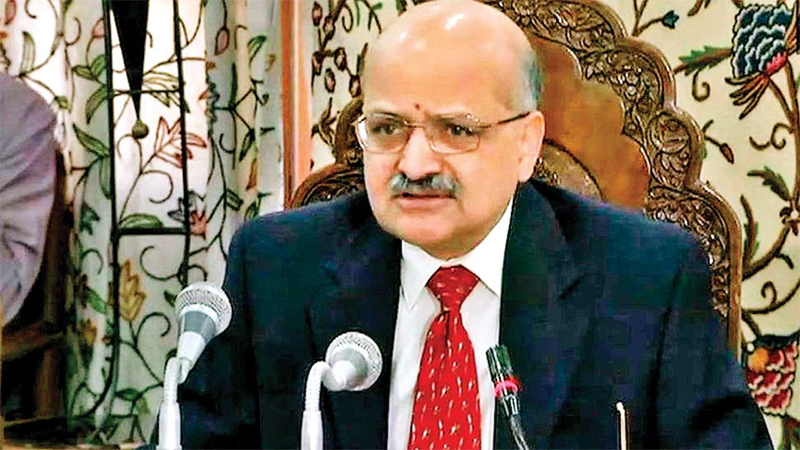Obtaining 2% of GSDP as additional borrowing from GoI
J&K needs to act fast on power sector, business, ULB reforms
Mohinder Verma
JAMMU, Jan 19: In order to get 2% of the Gross State Domestic Product (GSDP) as additional borrowings from the Government of India as recommended by the 15th Finance Commission, the Chief Secretary of Union Territory of Jammu and Kashmir BVR Subrahmanyam has directed the concerned Administrative Secretaries to achieve the specified core benchmarks as expeditiously as possible.
Official sources told EXCELSIOR that in the month of May last year the Union Government raised borrowing limits for the States and Union Territories for the current fiscal to 5% of the Gross State Domestic Product from 3% subject to their carrying out specific reforms.
This decision was taken keeping in view the fact that while entire country was struggling due to dwindling revenues following the near halt in economic activities because of the lockdown imposed to contain Novel Coronavirus (COVID-19), the condition was more precarious for several States and Union Territories with limited resources of their own, sources said.
The additional borrowing of 2% was linked with reforms in four areas such as universalization of “One Nation One Ration Card”, Ease of Doing Business, Power Distribution and Urban Local Body Revenues, sources informed.
The issue of availing of additional borrowing limit came up for discussion in the high-level meeting chaired by the Chief Secretary BVR Subrahmanyam recently wherein it was revealed that Union Territory of Jammu and Kashmir is eligible for 2% borrowings provided that the Government achieves core benchmarks in respect of Power Sector, One Nation One Ration Card, Property Tax and Business Reforms Action Plan.
“A constant relentless effort is required on the part of Administrative Secretaries to achieve the benchmarks in core areas to receive the borrowings from the Government of India”, sources said quoting the directions issued by the Chief Secretary in the meeting, adding “the Chief Secretary has explicitly told the concerned Administrative Secretaries to put in their best efforts forward to ensure the release of funds from the Government of India at the earliest”.
No doubt Jammu and Kashmir Union Territory has made substantial progress in the Business Reforms Action Plan but much is required to be done especially in the light of the fact that under the 4th edition of State Reform Action Plan 2019 announced by the Union Finance Minister Nirmala Sitharaman in the month of September last year the ranking of Jammu and Kashmir was 21st.
As far as One Nation One Ration Card is concerned, J&K had joined the initiative of the Government of India which enables ration cardholders to access PDS benefits from any fair price shop in the country in the month of August last year.
About power sector reforms, the Government of J&K UT in the month of June last year had constituted a Task Force headed by Principal Secretary, Power Development Department and comprising of Managing Directors of Jammu Power Distribution Corporation Limited, Kashmir Power Distribution Corporation Limited and J&K Power Transmission Corporation Limited.
“The initiatives to be implemented by the Task Force include Rs 90,000 crore liquidity infusion to DISCOMS as a concessional loan offering by PFC &REC Limited, tariff policy reforms encompassing consumer rights, promotion of industry and sustainability of power sector and distribution reforms in power sector”, sources said while disclosing that Chief Secretary has directed the Task Force to make all out efforts to achieve the objective behind its constitution.
About benchmark relating to Urban Local Body Revenues, sources said, “either the Union Territory of Jammu and Kashmir has to issue directions for the imposition of Property Tax to pave the way for generation of revenue for the Municipal Corporations, Municipal Councils and Municipal Committees or find out some alternative”.
In the month of October last year, the Union Ministry of Home Affairs (MHA) had empowered the Government of Union Territory of Jammu and Kashmir to impose Property Tax through the Municipal Corporations, Municipal Councils and Municipal Committees in their respective areas.
The powers were vested by way of several amendments in the Jammu and Kashmir Municipal Act, 2000 and Jammu and Kashmir Municipal Corporation Act, 2000 carried through the Jammu and Kashmir Reorganization (Adaptation of State Laws) Order, 2020. Earlier, there were no explicit provisions vis-a-vis imposition of Property Tax in both these laws enacted by the Legislature of erstwhile State of Jammu and Kashmir.


